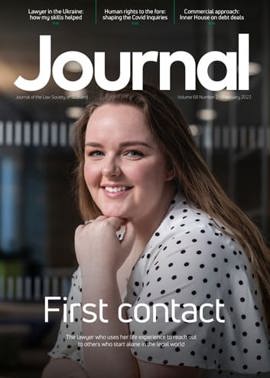Editorial: Open to all?
Widening access to the legal profession is a cause that has rightly been espoused by the Society, many employers in the profession, and others in recent years. Awareness has been growing both of the rightness of reaching out to sectors of society with little knowledge of the possibilities from a legal career, and of the potential benefits from tapping into a hidden pool of talent.
This month’s lead interview highlights how lack of knowledge of how the system works, to put it broadly, combined with lack of means, can continue to handicap at every stage those striving for a legal career, to the extent that some simply give up through feeling they are alone and isolated. On the knowledge side it surely indicates a need for a comprehensive mentoring programme, particularly at undergraduate level.
In one respect at least, however, the pendulum appears to have swung completely the other way. Last month it was revealed that in 2022, Edinburgh University accepted only students from disadvantaged backgrounds to study certain subjects, including law. Of 1,205 applicants for law, it offered its 170 places for Scottish students across the 650 from less advantaged areas, and none to those hopefuls deemed to be more privileged.
That is only a partial picture. It is not clear how the balance worked out across the country, and which, and how many (sufficiently qualified) applicants, and from where, were unable to achieve any offers. But however much one may support diversity and positive discrimination, it cannot be healthy – or fair – if any such exclusionary rule is applied over a sustained period.
Questions have been asked whether the Scottish Government’s funding policy for higher education, which limits the number of students the universities can accept for free tuition – a totem for the Government – is a contributing factor. Ministers defend the no fees policy on the ground that it keeps student debt down, but if the net result is exclusion via a different mechanism, does it strike the right balance?
Alternative routes to qualification are also being taken more seriously these days. Against that background, they are likely to be needed. There are those for whom they work better than the standard degree-based route, for example if they need to fit study in as an extra side to their lives rather than as their main focus, but more could be done to develop and promote them, including to those who miss out on a university place through no fault of their own.
At the end of the day, a system that is fair to all is only likely to be achieved through a coherent and joined-up approach from the first stage at which prospective students are considering their options.
Regulars
Perspectives
Features
Briefings
- Criminal court: Court declines rape sentence guidelines
- Employment: Reopening discipline proceedings – fair do?
- Family: Mediation – will Scotland catch up?
- Human rights: Abortion, protests and safe access zones
- Pensions: A good funding challenge for employers?
- Property: Title conditions – what’s in a name?
- Property: Scottish Barony Register – 2022 annual report
- Property: QES in a post-Covid world
In practice
- Public policy highlights: February 2023
- Accredited paralegal roundup
- Risk: Wills – the signing pitfalls
- Keep the faith with fax
- Calculating your carbon footprint
- Digital focus in new SLCC rules
- The Trades House: a charity funds management option
- The Society in a changing world
- Ask Ash: Homeworking when ill?







